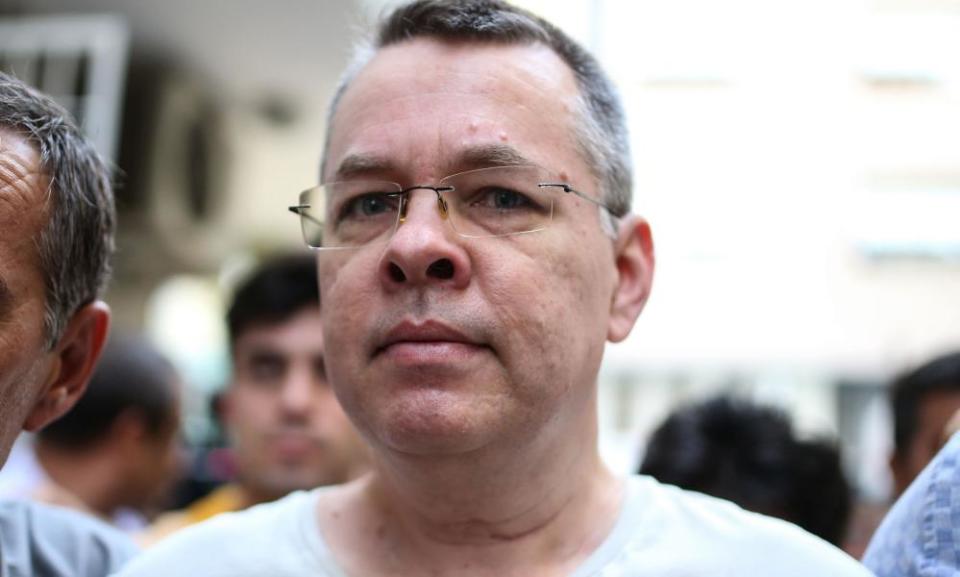Andrew Brunson: Turkey releases US pastor after two years in prison
Turkish court ordered release of Brunson, who had been held on terrorism charges related to the failed 2016 military coup

The American pastor at the centre of a bitter diplomatic rift between Washington DC and Ankara is flying back to the US after a Turkish court ordered his release following two years in detention.
Witnesses in the courtroom in the western town of Izmir said Andrew Brunson wept as the decision was announced on Friday.
“I am an innocent man. I love Jesus, I love Turkey,” he had earlier told the court.
The surprise release of Brunson – who had been held on terrorism charges related to the failed 2016 military coup – suggests US-Turkey relations are thawing as Ankara seeks US help in investigating the disappearance of Saudi journalist Jamal Khashoggi in Istanbul last week.
Donald Trump – who has made the case a foreign policy priority – told reporters that Brunson will land at a military base near Washington on Saturday and will likely visit the White House the same day.
“We’re very honored to have him back with us,” he said. “He suffered greatly but we’re very appreciative to a lot of people.”
Brunson was convicted of terrorism charges and sentenced to three years and one and a half months, but the court took time served into account and the remainder of his sentence was suspended. The interim panel of judges also lifted judicial control provisions, leaving Brunson free to travel outside Turkey.
His lawyer Jay Sekulow, who is also a member of Trump’s legal team, said the ruling was a “a significant victory for Pastor Brunson and his family”. .
“We’re grateful to the president, members of Congress and diplomatic leaders who continued to put pressure on Turkey to secure the freedom of Pastor Brunson,” he said.
US media reported on Thursday that Brunson’s freedom had been negotiated as part of a secret deal between Ankara and Washington which would lift like-for-like sanctions that have sent the Turkish lira plummeting. Trump denied that any deal had been made.
Vice-President Mike Pence said the evening before the hearing he was “hopeful” of Brunson’s release, but denied the existence of any deal.
Brunson, who was moved from prison to house arrest for health reasons in July, appeared in court for the fourth time to face allegations of links to the outlawed Kurdish separatist PKK, as well as the religious Gülenist movement, which Turkey says was behind the failed 2016 military coup.
During the six-hour-long proceedings witnesses called for the prosecution backtracked or contradicted their previous testimony regarding Brunson’s alleged crimes. The prosecutor also revised down earlier calls for a 35-year jail sentence to 10 years.
The 50-year-old, who has lived in Turkey since the mid-1990s, is one of an estimated 50,000 people caught up in a crackdown on opposition launched by President Recep Tayyip Erdoğan in an attempt to consolidate control after the coup attempt.
Brunson’s release is expected to lead to the end of crippling sanctions and tariffs on Turkish steel and aluminium which Washington imposed on its Nato ally this summer amid growing frustrations over his case.
The tit-for-tat row sparked fears of a full-blown economic crisis in Turkey and sent shockwaves rippling through other emerging markets. On Thursday night the lira steadied at 5.95 to the dollar as markets anticipated Brunson’s potential release.
The unusual catalyst for progress in Brunson’s case has come in the form of a separate diplomatic crisis in Istanbul, where Turkish officials have accused Saudi Arabia of murdering journalist Jamal Khashoggi and disposing of his body at the Saudi consulate in the city last week.
While Turkey maintains Saudi Arabia sent a 15-man assassination team to silence Khashoggi, who has been critical of Crown Prince Mohammed bin Salman’s policies, it is seeking US help in investigating the case in order to avoid antagonising its already fragile political and trade relations with Riyadh.
Brunson’s detention had severely damaged ties between the US and Turkey in recent years, despite the two countries’ shared security interests, particularly in Syria.
Many thorny issues still divide them.
Erdoğan had previously suggested Brunson could be exchanged in a prisoner swap for Mehmet Hakan Atilla, a banker imprisoned earlier this year after US prosecutors found the Turkish state-owned HalkBank had helped Iran evade oil sanctions.
The US has also infuriated Erdoğan by refusing to extradite Fethullah Gülen, the Turkish preacher living in Pennsylvania who Turkey says masterminded the 2016 coup.
On Friday, before Brunson’s hearing began, the Turkish president once again expressed disappointment that US-backed Kurdish militias in Syria have not left the northern town of Manbij, as per a US-Turkish agreement brokered earlier this year.
Turkey would “do what was necessary” to protect its security, he told supporters at a rally in the south of the country.
Turkey views the Syrian-Kurdish YPG as a terrorist organisation and extension of its own Kurdish movement, the PKK.

